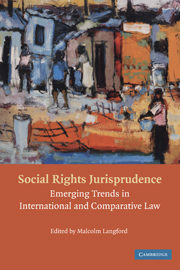Book contents
- Frontmatter
- Contents
- Foreword – Philip Alston
- Preface
- PART ONE OVERVIEW
- PART TWO SELECT NATIONAL JURISDICTIONS
- 4 South Africa
- 5 India
- 6 South Asia
- 7 Colombia
- 8 Argentina
- 9 Brazil
- 10 Venezuela
- 11 Canada
- 12 The United States
- 13 Hungary
- 14 France
- 15 United Kingdom
- 16 Ireland
- PART THREE REGIONAL PROCEDURES AND JURISPRUDENCE
- PART FOUR INTERNATIONAL HUMAN RIGHTS PROCEDURES AND JURISPRUDENCE
- PART FIVE SPECIAL TOPICS
- Notes on Contributors
- Table of Authorities
- Index
- References
16 - Ireland
The Separation of Powers Doctrine vs. Socio-economic Rights?
Published online by Cambridge University Press: 05 June 2012
- Frontmatter
- Contents
- Foreword – Philip Alston
- Preface
- PART ONE OVERVIEW
- PART TWO SELECT NATIONAL JURISDICTIONS
- 4 South Africa
- 5 India
- 6 South Asia
- 7 Colombia
- 8 Argentina
- 9 Brazil
- 10 Venezuela
- 11 Canada
- 12 The United States
- 13 Hungary
- 14 France
- 15 United Kingdom
- 16 Ireland
- PART THREE REGIONAL PROCEDURES AND JURISPRUDENCE
- PART FOUR INTERNATIONAL HUMAN RIGHTS PROCEDURES AND JURISPRUDENCE
- PART FIVE SPECIAL TOPICS
- Notes on Contributors
- Table of Authorities
- Index
- References
Summary
INTRODUCTION
The Irish Constitution is the oldest in Europe and predates the international human rights discourses, including those regarding socio-economic rights. Its framers expressly included only one socio-economic right (the right to education) in the document, preferring instead to set out ‘the principles for the State to apply towards the promotion of the people as a whole in the socio-economic field’ in the form of non-justiciable ‘principles of social policy’. In the words of one commentator, while Eamon de Valera, the leading figure in the drafting of the constitution, cleverly genuflected before socio-economic rights, he made sure to insert them in a part of the constitution that is prima facie unenforceable.
Despite the lack of provision for a comprehensive range of socio-economic rights under the Irish Constitution, a number of judges have handed down decisions resulting in the direct or indirect protection of socio-economic rights. However, concerns about the implications of adjudication of socio-economic rights for the separation of powers and the involvement of the courts in what have been deemed issues of ‘distributive justice’ has, in more recent times, resulted in a general reluctance on the part of courts to recognise and give proper effect to such rights.
PROTECTION OF SOCIAL RIGHTS UNDER THE IRISH CONSTITUTION
Overview of Relevant Provisions
The Constitution contains a wide range of socio-economic, rights-related provisions of both a justiciable and non-justiciable nature. Article 42 provides that:
4. The State shall provide for free primary education and shall endeavour to supplement and give reasonable aid to private and corporate educational initiative, and, when the public good requires it, provide other educational facilities or institutions with due regard, however, for the rights of parents, especially in the matter of religious and moral formation. […]
- Type
- Chapter
- Information
- Social Rights JurisprudenceEmerging Trends in International and Comparative Law, pp. 295 - 320Publisher: Cambridge University PressPrint publication year: 2009
References
- 2
- Cited by

